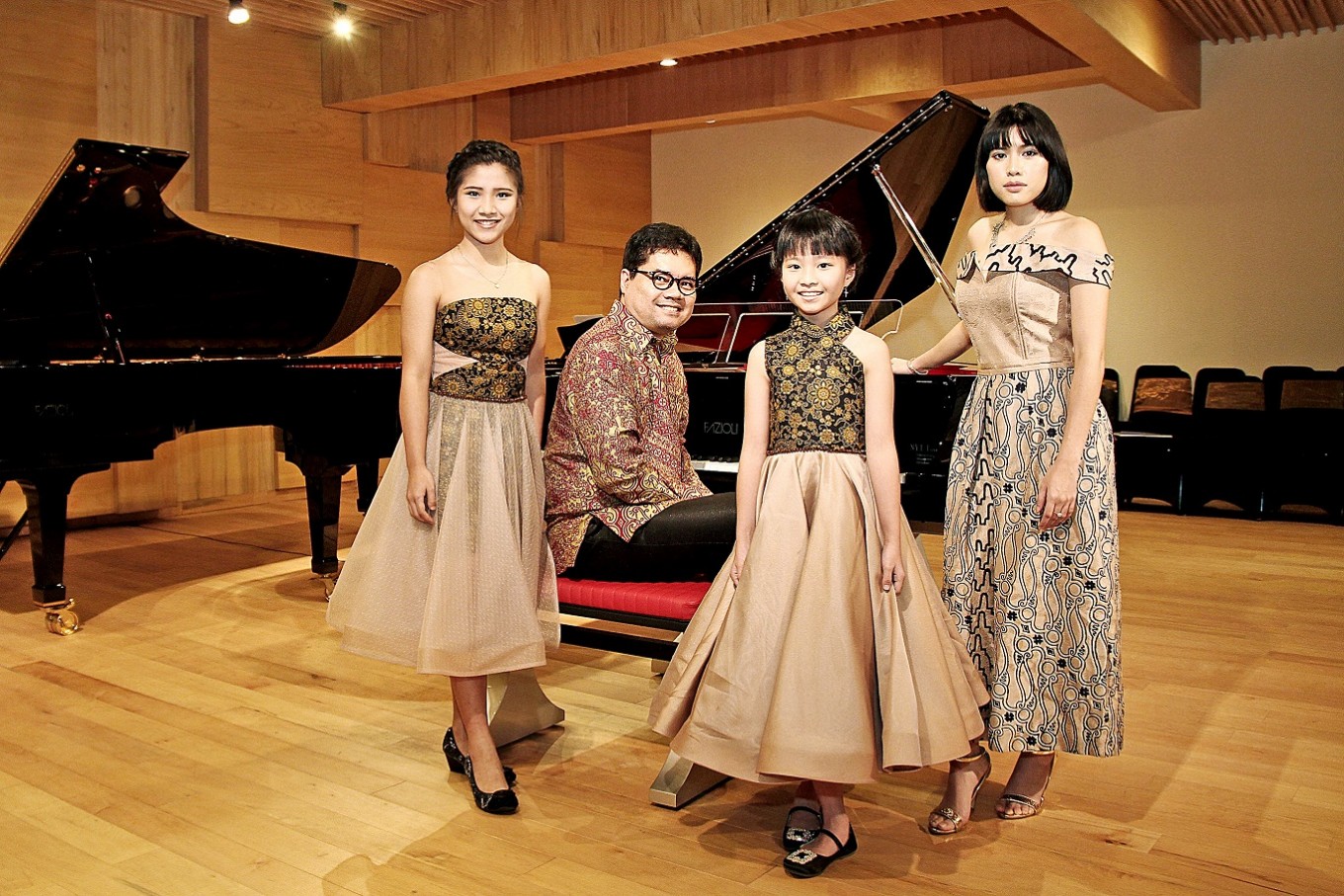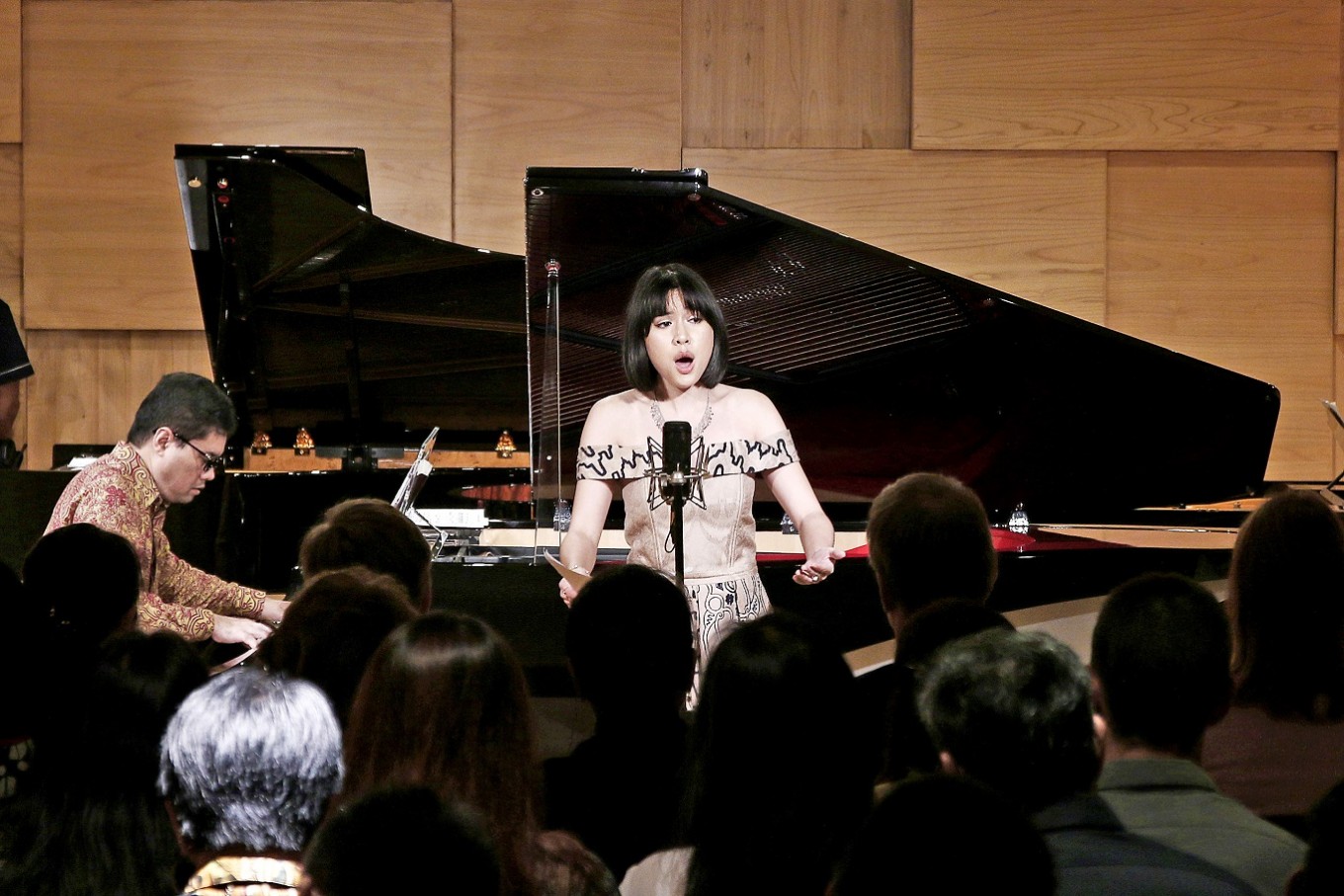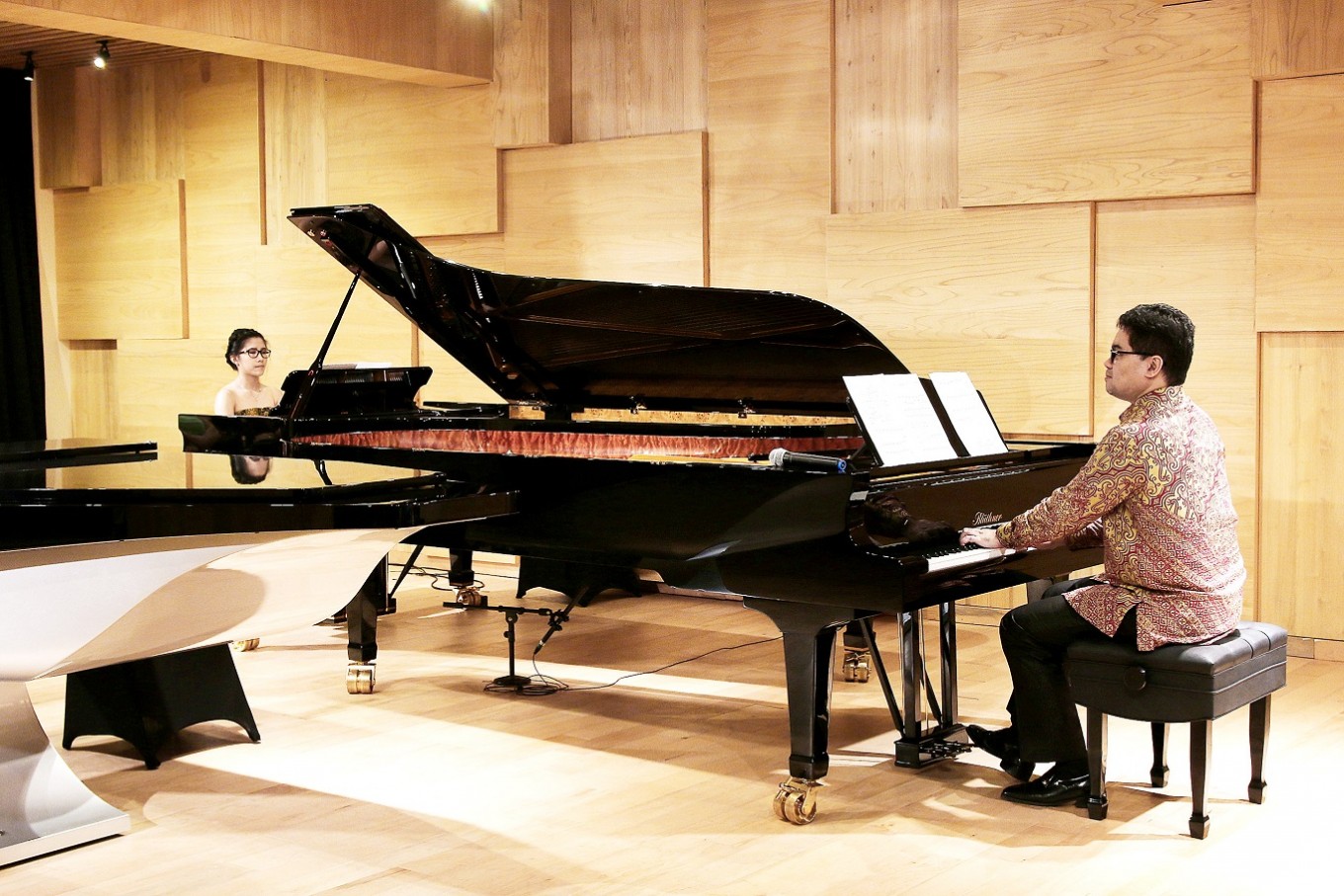Popular Reads
Top Results
Can't find what you're looking for?
View all search resultsPopular Reads
Top Results
Can't find what you're looking for?
View all search results'Differences Unite' in Ananda Sukarlan piano concert
Ananda Sukarlan’s latest piano concert proves that differences in musical technique can blend harmoniously, and so can differences in real life.
Change text size
Gift Premium Articles
to Anyone
T
he orchestral composition of The Humiliation of Drupadi lasted for more than six minutes. The two-piano work was mellow and delicate in the beginning, reminiscent of the sound of Javanese gamelan, but later turned thunderous with powerful notes.
Pianist Ananda Sukarlan played the composition inspired by the epic tale “Mahabharata” in a duet with 16-yearold Gabriella Prisca Handoko at his annual The Jakarta New Year Concert.
This year’s concert was one of a kind. Instead of being held on the stage of a playhouse, the venue chosen was the showroom of The Grand Piano gallery in the Fagetti building, North Jakarta. A warm and friendly ambience filled the space. Among the audience of the Jan. 22 concert organized by Yayasan Musik Sastra Indonesia (Indonesian Classical Music Foundation) and The Grand Piano Signatures were foreign ambassadors and diplomats with their families and friends as well as classical music enthusiasts.
Read also: Music app promises to improve your hearing
Ananda interacted with the audience by revealing the stories behind each composition and performance, while voicing his concerns about growing racial and religious intolerance in Indonesia.
Through the concert titled “Differences Unite” Ananda expressed his view of the beauty of co-existence.
“You need to play both black and white keys on a piano to make music. You need the major notes and the minor notes to create harmony. These differences make music colorful,” he said.
Playing on the avant-garde art-case M. Liminal built by Fazioli Pianoforti, Ananda opened the recital with Ismail Marzuki’s “Ibu Pertiwi” (Motherland), which he had rearranged in a classical tonality. That was followed by “December, 2016,” a piece he composed after listening to the adzan (call to prayer) from a mosque near his South Jakarta home prior to Christmas. The result was a combination of familiar carols and his pianist interpretation of the sound of the adzan. The highlight of the concert, however, was the debut of young talents. Guest performer Gabriella, winner of last year’s Ananda Sukarlan Awards in the junior category, played Chopin’s “Bolero Op. 19” — a playful piece with keys difficult to establish, mixing Spanish flavor with Polish folk dance.
 Rising stars: Pianist Gabriella Prisca Handoko, 16, (left) and Jesslyn Cheryl Handoko, 10, as well as singer Mariska Setiawan (right) join Ananda Sukarlan (sitting) at the 'Differences Unite' concert.(Ananda Sukarlan Center for Music & Dance/File)
Rising stars: Pianist Gabriella Prisca Handoko, 16, (left) and Jesslyn Cheryl Handoko, 10, as well as singer Mariska Setiawan (right) join Ananda Sukarlan (sitting) at the 'Differences Unite' concert.(Ananda Sukarlan Center for Music & Dance/File)
Her sister Jesslyn Cheryl Handoko, 10, winner of the same award for the elementary category, appeared next to perform Ananda’s dynamic composition “Balinese Mosquito Dance.”
The siblings also played four-hands for a medley of folklore songs that ended with the grandeur composition of North Sumatra’s “Rambadia.”
Surabaya-based soprano Mariska Setiawan joined Ananda to sing two songs based on poems by Federico Garcia Lorca, namely “Las Seis Cuerdas” (The Six Strings) and “Oda a Salvador Dali” (Ode to Salvador Dali) — the painter with whom the poet had an open homosexual relationship.
Read also: Lady Gaga says Super Bowl halftime show is 'for everyone'
Ananda also composed music for two poems by Indonesian poet Hasan Aspahani, the sweet and melodious “Chrysanthemum” and the emotional “Sejarah Sajadah” (History of the Prayer Mat).
Mariska sang the love poem “Prabahita” by another Indonesian poet, 25-year-old Adimas Immanuel, in a soft tone, but she got more expressive belting out the poet’s “Iras.”
 Solemn concert: Soprano Mariska Setiawan accompanies pianist Ananda Sukarlan at the latter's Jakarta New Year Concert.(Ananda Sukarlan Center for Music & Dance/File)
Solemn concert: Soprano Mariska Setiawan accompanies pianist Ananda Sukarlan at the latter's Jakarta New Year Concert.(Ananda Sukarlan Center for Music & Dance/File)
The theme of “Differences Unite” ran consistently throughout the concert that lasted for over one hour. The concept was reflected not only in the selection of the numbers performed, but also in the delivery itself.
The only Indonesian listed among the 2,000 Outstanding Musicians of the 20th Century and The International Who’s Who in Music, Ananda demonstrated what he meant about differences in musical techniques able to let out harmonious sound. He played a two-minute piece he described as “insignificant,” which was composed for his daughter when she started to learn the piano. He played the tunes with only two fingers on one hand and three fingers on the other hand. Ananda also performed “Lonely Child” (Rapsodia Nusantara No. 15), a one-finger composition adopting a piece of Lampung folk music he wrote for children with different abilities in Spain.
“In real life, the differences among us are supposed to enrich us as a whole instead of being a source of conflict.”











